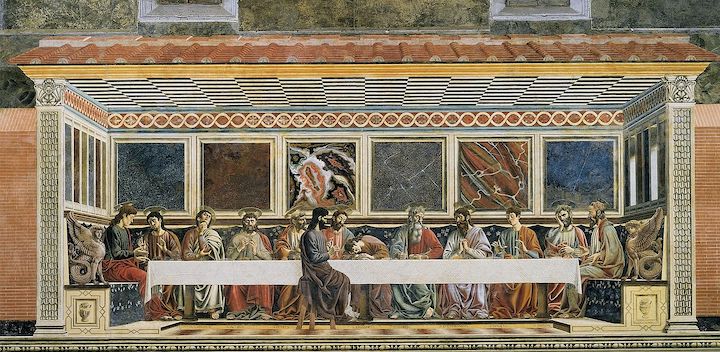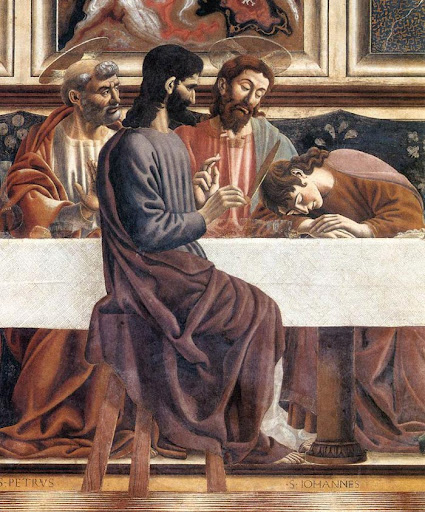It’s time to cease creating dubious excuses in defense of President Biden and his Catholic practice. The smiles and photo-ops that will occur in Rome when Biden meets Pope Francis cannot hide the truth: the president has betrayed the Lord in using his office to enable the destruction and death of innocent children in the womb. And it’s clear that even his defenders know it by the form their excuses take.
“Jesus gave Communion to Judas at the Last Supper,” runs one argument for allowing the president, House Speaker Nancy Pelosi, and other abortion-enabling politicians to receive the Eucharist at Mass. “Jesus was inclusive of Judas. So the bishops should follow Jesus’ example and not prohibit politicians from receiving Communion.”
The absurdity of comparing anyone to Judas aside, in good faith consider: In giving Judas the Eucharist, shortly after the rebellious apostle had sold his master for thirty coins, was Jesus signaling to His apostles that there should be no rules governing the wondrous sacrament He just instituted and entrusted to them? That all are welcome at His table, at all times, no matter what one has done? Are bishops, then, with their rules for receiving the sacrament, like the Pharisees, whom Jesus denounced since “they bind heavy burdens, hard to bear, and lay them on men’s shoulders”? (Matt 23:4)
Jesus instituted the Eucharist – the sacrament of His own body and blood – at the Last Supper. This event, like every healing and teaching of His, could not be fully understood until after He suffered, died, and rose. What could the apostles have been thinking when Jesus handed them the bread and declared it His body? Or, more peculiarly, when he passed the chalice, calling the wine in it “my blood of the covenant” that is poured out – present tense – for the forgiveness of sins? What covenant and whose sins? And that they should “do this in remembrance of me”?
The Crucifixion of the Son of God on Good Friday, at the very hour when the Passover lambs were being slaughtered in the Temple nearby, helps us interpret the supper ritual of Holy Thursday. Jesus is the new Passover, the Lamb of God, who takes away the sins of the world. He sacrificed His body and poured out His blood for our salvation; this is the new and eternal covenant. He commanded that the Eucharist be perpetuated so His salvation would remain accessible until the end of time.
Only then did the Last Supper – and what Jesus said a year earlier at the Sea of Tiberias – make sense: “He who eats my flesh and drinks my blood has eternal life, and I will raise him up on the last day.” (John 6:54)
Judas, through his mortal sin, is the ignoble link between the Last Supper and the Cross. He betrayed Jesus Christ. He arranged that Jesus’ body might be taken and His blood poured out. He cloaked his betrayal in an act of friendship: the fatal kiss. Even in doing that, he might have called himself a devout follower of Jesus.
In giving Judas the Eucharist, Jesus was not including him out of love nor “weaponizing” the freshly instituted sacrament for ulterior motives. No. Judas deceived Jesus; his heart turned against Him. Jesus allowed for Judas’ reception to be an outward sign of the dead soul within him.

By taking the Eucharist, Judas teaches the extreme gravity of receiving our Lord’s body in a state of sin – it leads to destruction and death. The bread of life becomes a path of death.
Jesus, the model Pastor, did not call Judas a wayward soul needing gentle correction. He called Him “lost,” the “Son of Perdition.” (John 17:12) Jesus added, in the most harrowing lines of Scripture, “Woe to that one by whom the Son of Man is betrayed! It would have been better for that one not to have been born.” (Matt 26:24)
Those are hardly words of sentimental love and inclusion.
Nor was Jesus, unlike some today, interested in perpetual dialogue with His betrayer: “What you are going to do, do quickly.” (John 13:27)
Judas teaches us that to receive the Eucharist in a state of mortal sin is to betray the Lord Himself. Jesus was not playing “gotcha” with Judas in giving him Communion in a state of sin. As with Jesus submitting to John’s baptism, in the eyes of Providence Judas’ reception, as a lesson for all of us, was “fitting to fulfill all righteousness.” (Matt 3:15)
To keep a hard heart, decade after decade, in support of abortion – and, most recently, to allow the repeal of the Hyde Amendment, to consent to the House passing the Women’s Health Protection Act, to sue to overturn Texas’s law prohibiting abortion – is not comparable either to the betrayal of another apostle on Holy Thursday: Peter. The fisherman fell in a moment of weakness and immediately acknowledged his sin by weeping over it. The president, by contrast, has dug his heels in deeper in defiance of the bishops, the successors of the apostles whom Jesus ordained to perpetuate – and to protect – the Eucharist.
Judas, unlike Peter, never asked for forgiveness, which is why he was “lost.” But in an irony fit for today’s controversy, Judas at least had the humility to see what the president cares not to: “I have sinned by betraying innocent blood.” (Matt 27:4)
So there are reasons to compare Judas’ reception of Communion with President Biden’s – reasons why Biden ought not to receive, and why he should be admonished if he insists.
St. Paul may well have had the Son of Perdition in mind when he wrote these words within two decades of the Eucharist’s institution: “Whoever, therefore, eats the bread or drinks the cup of the Lord in an unworthy manner will be answerable for the body and blood of the Lord.” (1 Cor 11:27) We ought to have the president – and the salvation of his soul – in mind as we read those words today.
*Image: The Last Supper by Andrea del Castagno, c. 1445-50 [Museo di Cenacolo di Sant’Apollonia, Florence, Italy]. Unique in Castagno’s depiction is the position of Judas, who sits alone on the other side of the table:
You may also enjoy:
Robert Royal’s Our First Anti-Catholic “Catholic” President
Fr. Timothy V. Vaverek’s Pastoral Incoherence















